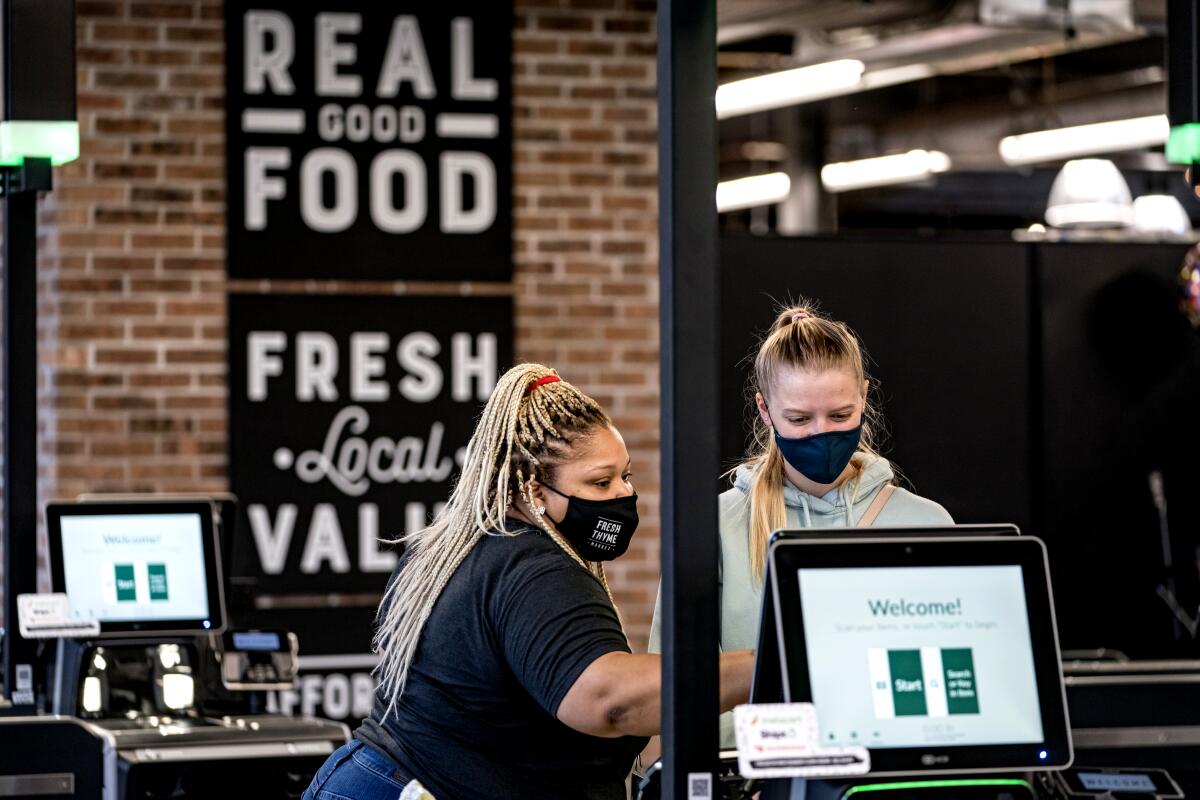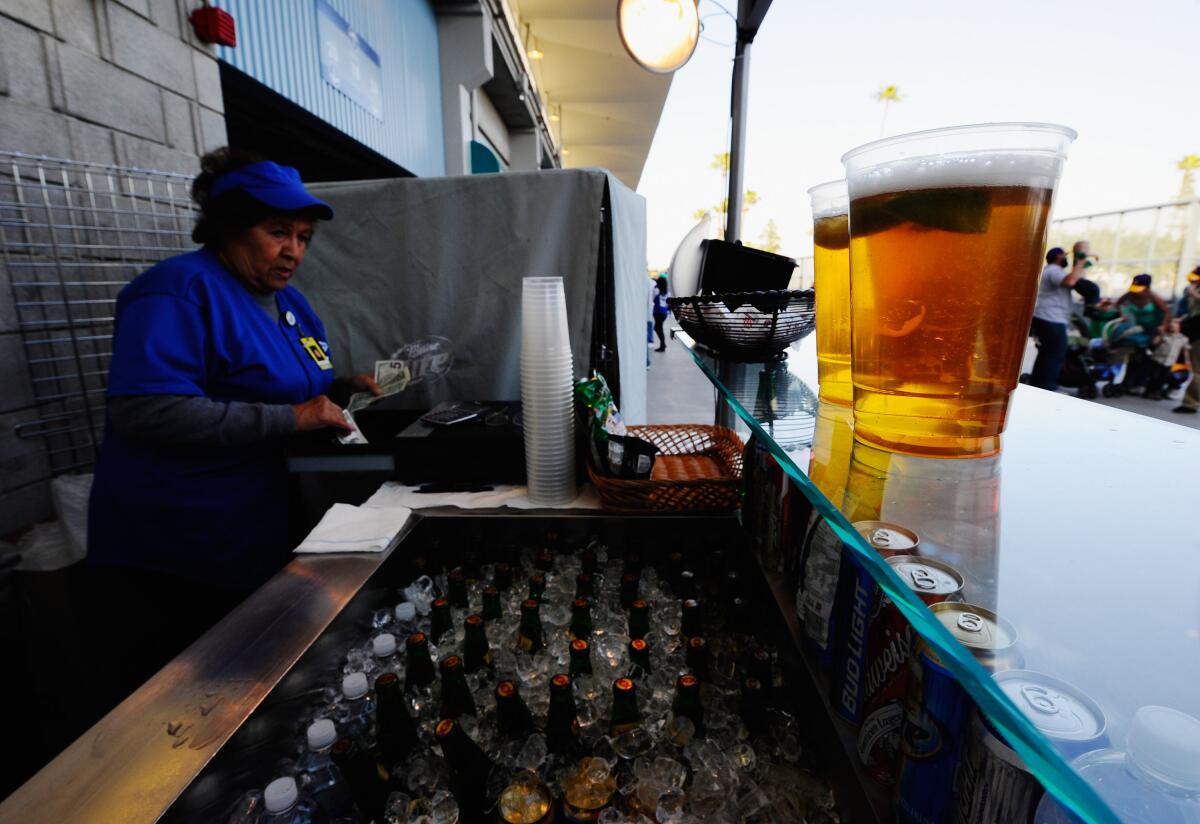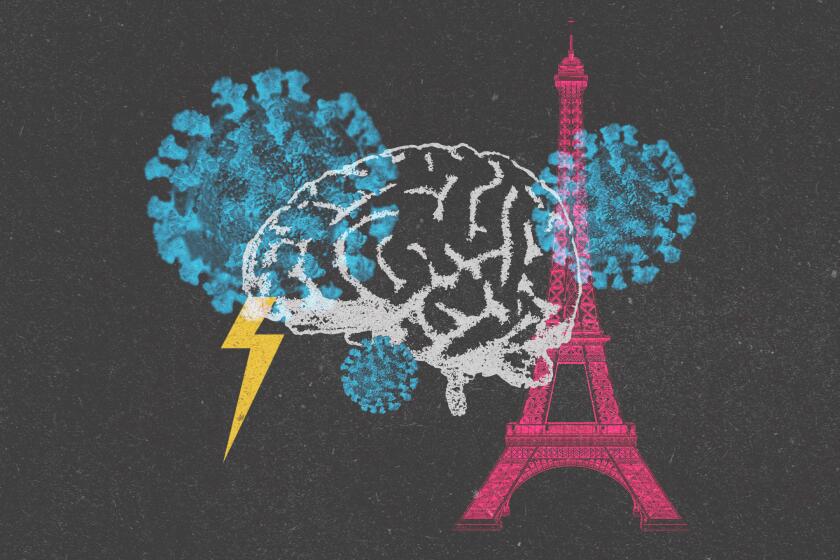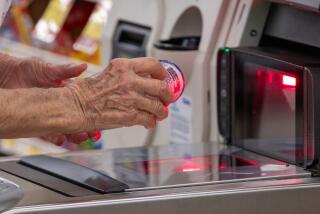Column: Self-serve beer at Dodger Stadium? Nope. Let’s take the ‘self’ out of ‘self-service’

- Share via
During my recent bout with COVID, I was doing what I always do when I am ill or exhausted or in need of mental comfort: rereading Agatha Christie. In the middle of “The Mirror Crack’d From Side to Side,” Jane Marple commiserates with one of her friends about all the changes that have come to their beloved village, St. Mary Mead. These include a modern grocery store in which, Miss Marple is told, “You’re expected to take a basket yourself and go round looking for things … and then a long queue waiting to pay as you go out. Most tiring.”
Miss Marple is, like her creator, a child of the Victorian era, and even in 1962, when the book came out, she still has a housemaid and a friendly doctor who makes house calls.
Which may be why, subconsciously, I chose it. I can do without a housemaid and the class structure she represents, but imagine living in a world where doctors made house calls! Or where you took your list to a store and a helpful clerk brought you whatever was on it.
These days the closest you get to a house call is a telemed appointment, which is not the same thing at all. You can also order your groceries online and have them delivered, but even when you don’t get bizarre substitutions (what exactly am I supposed to do with three bags of oranges?), it feels very soulless and most tiring. Especially since it supports apps that underpay their employees (please tip your delivery person).
Though not as soulless and tiring as the dreaded “self-checkout.” Grocery and big-box stores are increasingly filled with DIY registers. Having filled your basket yourself, you are now also expected to pull unpaid clerk duty, while being treated to regular demands that you put your item in or take your item out of the bagging area made in the chilling monotone of a Dalek announcing its intention to “exterminate.”
The collective message of Emmy-favorite dramas reflects a more general feeling of being trapped and manipulated by forces greater than ourselves.
It isn’t just stores; Dodger Stadium recently installed ID-checking, self-serve beer machines. Not only does this raise lots of questions about borrowed IDs, but what’s going to happen when those $17.99 blonde ales refuse to drop? Or when some poor soul takes too long punching the buttons? It’s tough to imagine glitches involving unmanned beer machines are going to end well.
Since the invention of the vending machine, self-service was created purportedly to save us time, money and inconvenience; why wait in line for those movie tickets or on hold for those flight reservations if you can buy them from the comfort of your own home?
Most “self-service” accomplishes none of these things. Even before this latest surge of inflation, everything seemed just as expensive. No discounts are involved in using any self-service system; indeed, many digital transactions include an online service charge. (Um, what service am I being charged for?)

Honestly, is waiting in line to talk to a trained worker really more time-consuming than spending hours hunched over a screen searching/downloading/uploading/entering your credit card number online only to have what you thought was a completed transaction vanish into the ether?
Well, yes, when there are a dwindling number of actual people to talk to. Sometimes long lines are inevitable, but too often they are simply a matter of understaffing. Companies create a problem, then “solve” it with self-service.
Increasingly, this solution feels like it is serving no one but wily corporations, who have managed to shift the burden of labor to people who are paying them while funneling savings directly to their shareholders.
It’s a Tom Sawyer-like con job, without the Twainian charm; not only is the consumer increasingly doing all the work, we’re taking the blame when the system fails. Seriously, if I read one more piece advising travelers how to avoid ghastly flight experiences — “give yourself” extra travel days; get to the airport three hours early; do not check bags; fly nonstop; build your own airplane and learn how to fly it — I will scream.
Avoiding ghastly flight experiences is not the responsibility of the people who paid for the tickets! Stop overbooking your damn flights, airlines. And hire more people! At fair wages! Because the only thing worse than standing in a hideously long line is standing in a hideously long line when there are only two of 10 workstations open and the people operating them look like they are going to drop from exhaustion.
Trader Joe founder Joe Coulombe, who died last year, wrote a long, entertaining history of one of L.A.’s most iconic chains. Now you can read it.
I myself came of age during the self-service revolution — I am old enough to remember my mother’s delight when our bank installed a drive-through arrangement enabling transactions via pneumatic tubes.
I also remember her outrage when she realized she was going to have to pump her own gas. Self-service gas stations came of age in the late ’70s and were one of the major harbingers of the revolution, although they remain illegal in most of Oregon and all of New Jersey.
Now banking is so automated that you can deposit a check using only your smartphone, and if your local bank’s ATM is on the blink, it will give directions to the nearest working ATM, rather than suggest you pop into the bank, the door of which is two feet away.
But then the bank only has two tellers working and a line 10 people deep. So why not just drive three miles to another ATM and save the bank the trouble of hiring another teller? So much simpler. For the bank. Not so much simpler for the consumer, or the tellers, or the people who once worked as tellers but got downsized.
Oh, and when you have to post a video showing people how to proceed with some self-service system purportedly designed to save them time, it is no longer self-service; it is unpaid work. And don’t get me started on the Homeric list of passwords we each must maintain to access online self-service, passwords we are constantly advised to change because some platform or other has just been hacked.
Miss Marple may have been able to solve the cleverest murder by remembering some similar person or event that happened once in St. Mary Mead, but I don’t see her surviving the two-factor authentication system.
I realize I sound like a next-gen Andy Rooney, i.e., a cranky old lady who just had COVID and is still tired all the time. Obviously there are many instances when self-service does exactly what it is supposed to do — make life easier for the consumer. But with multitasking already a do-or-die requirement of modern capitalism, which forces many of us to hold down numerous jobs while offering virtually no support in terms of child or elder care, it seems a bit rich that we are also increasingly asked not only to pay more for goods and services but to work for them too.
We’ve all got COVID again, and the fog feels cumulative; in a summer when even vacation offers no respite, some form of convalescence feels necessary.
I am not advocating we return to “simpler times.” For 98% of the people who walk this planet, there were no “simpler times.” Too many of our industries were built on the backs of enslaved, underpaid or otherwise exploited labor forces.
But let’s not delude ourselves that self-service has fixed this problem. It has only allowed businesses to shift a huge portion of the labor to the consumer and pocket the difference. Indeed, if any entrepreneur wants to stand out these days, she or he might think about ways to give the customer what they’re paying for without making them work so hard to get it.
The first step might be taking the “self” out of “self-service.”
I mean, if we’re paying more than five bucks a gallon for gas, expecting someone to pump it for us and maybe clean the windshield does not seem all that unreasonable. Even for those of us who don’t live in New Jersey.
More to Read
The biggest entertainment stories
Get our big stories about Hollywood, film, television, music, arts, culture and more right in your inbox as soon as they publish.
You may occasionally receive promotional content from the Los Angeles Times.













